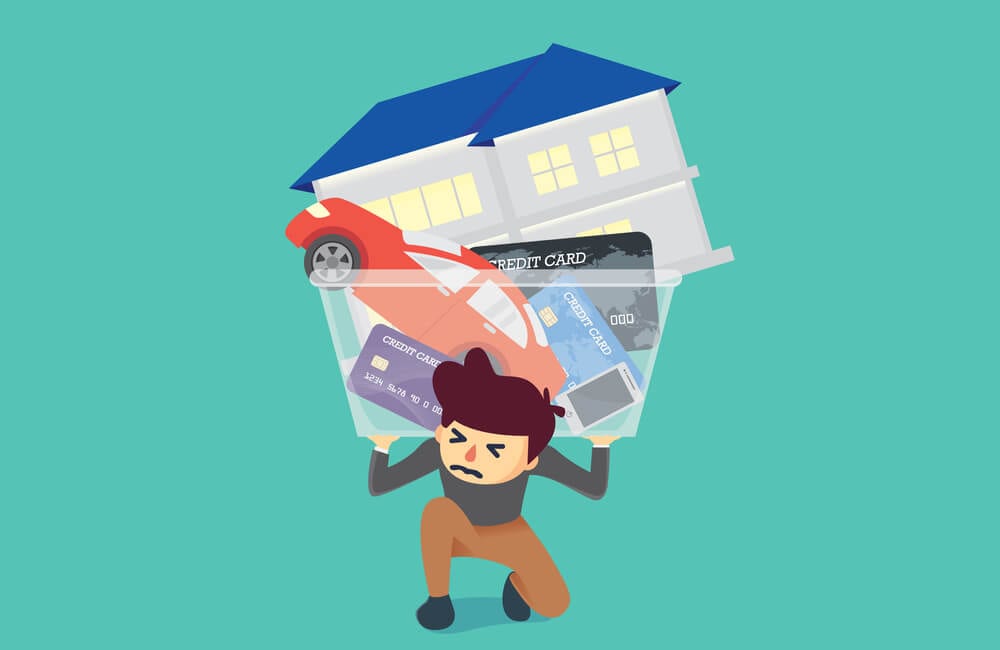
Debt is an obligation of a borrower to repay money, goods, or services to a lender. It is typically incurred through borrowing funds from a bank or other financial institution.
Ultimately, debt allows individuals and businesses to purchase items now that will be repaid in the future. When it comes to understanding how credit scores affect borrowing, one must first understand what debt is and how it works.
A person’s credit score is determined by their past payment history on any existing loan they may have. The higher your credit score the better terms and interest rates you can get when applying for new loans or lines of credit as lenders are more likely to trust you as someone who pays back their debts on time.
On the flip side, if you have lower scores due to not paying off your debts on time then lenders may charge higher interest rates or refuse loan applications altogether, making it harder for borrowers with poor scores to access necessary financing such as mortgages or car loans.
Understanding Credit Scores and Their Impact on Borrowing

Source: www.experian.com
When it comes to borrowing money, having a good credit score is essential. Credit scores are determined by your history of financial decisions, such as making payments on time or taking out loans responsibly. Banks use them to determine how much they can lend you, and at what interest rate.
A low credit score may mean that you will be unable to get a loan or that the terms of the loan will be unfavorable in comparison with someone with a better score. On the other hand, if you have an excellent record with lenders, banks may offer you more favorable terms when it comes to borrowing money.
A person’s credit score also affects their ability to secure housing and even some jobs. Landlords often use credit scores as part of their decision-making process when deciding whether or not to accept tenants into rental properties; similarly, employers may look at prospective employees’ financial histories before offering them positions within their company.
Therefore, understanding your credit score is key for managing debt properly and avoiding potential negative consequences down the line.
Tips for Managing and Paying Off Debt

Source: www.incharge.org
Paying off debt can be a challenging task, but with the right strategies and approaches it is possible to manage your debt effectively. Here are some tips for managing and paying off your debts:
1. Make a budget: The first step in dealing with debt is creating a detailed budget of your income and expenses so you know exactly how much money you have coming in each month, and where it’s going out. This will help you identify areas where you can reduce spending or make cuts to free up more money for debt repayments.
2. Prioritize payments: Once you’ve made a budget, prioritize which debts need to be paid first – such as those that have higher interest rates or late fees – so that they don’t become even greater problems later on. Make sure all minimum payments are kept up-to-date before tackling other debts with larger balances.
3. Consolidate: Consider consolidating multiple loans into one loan if this makes sense financially for your situation; this approach may help simplify repayment by providing lower monthly payments over an extended period while helping save on interest charges too!
4. Negotiate: Don’t be afraid to negotiate better terms or payment plans with creditors; most companies understand the hardship people face when trying to pay down their debt and may be willing to work with customers if they demonstrate a willingness to stick to agreed-upon terms over time (e.g., making regular payments).
5. Set goals: Setting small achievable goals along the way can help keep motivation high when repaying large amounts of debt—such as aiming for certain milestones like reducing balance by 10% every few months—so break down big tasks into smaller ones that feel manageable within shorter periods!
Conclusion

Source: www.npr.org
In conclusion, understanding debt and credit scores is an important aspect of borrowing money. Knowing how your credit score affects the types of loans you can get and the interest rate you will pay is essential for making informed decisions about your finances.
Having a good credit score can open up many opportunities when it comes to borrowing money, so make sure to maintain a solid record with lenders to take advantage of these options.




